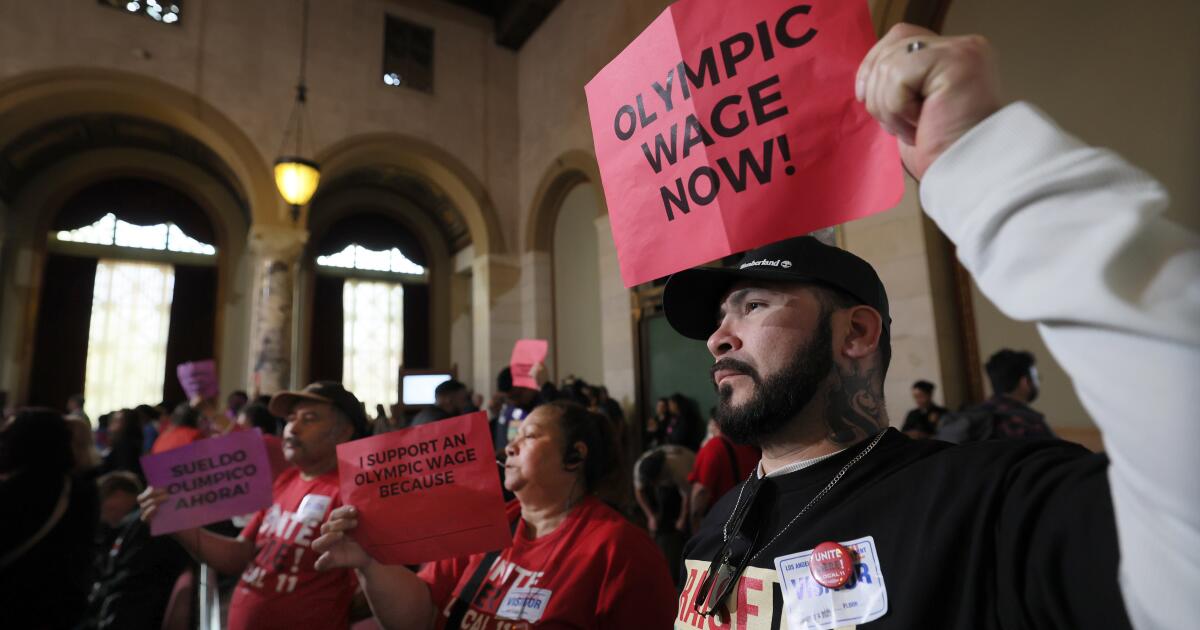When Los Angeles City Council members took up a plan to hike the wages of tourism workers this week, they received some carefully worded advice from city lawyers: Don’t vote on this yet.
Senior Assistant City Atty. Michael J. Dundas advised them on Wednesday — deep into their meeting — that his office had not yet conducted a final legal review of the flurry of last-minute changes they requested earlier in the day.
Dundas recommended that the council delay its vote for two days to comply with the Ralph M. Brown Act, the state’s open meeting law.
“We advise that the posted agenda for today’s meeting provides insufficient notice under the Brown Act for first consideration and adoption of an ordinance to increase the wages and health benefits for hotel and airport workers,” Dundas wrote.
The council pressed ahead anyway, voting 12-3 to increase the minimum wage of those workers to $30 per hour by 2028, despite objections from business groups, hotel owners and airport businesses.
Then, on Friday, the council conducted a do-over vote, taking up the rewritten wage measure at a special noon meeting — one called only the day before. The result was the same, with the measure passing again, 12-3.
Some in the hotel industry questioned why Council President Marqueece Harris-Dawson, who runs the meetings, insisted on moving forward Wednesday, even after the lawyers’ warning.
Jackie Filla, president and chief executive of the Hotel Assn. of Los Angeles, said the decision to proceed Wednesday gave a political boost to Unite Here Local 11, which represents hotel workers. The union had already scheduled an election for Thursday for its members to vote on whether to increase their dues.
By approving the $30 per hour minimum wage on Wednesday, the council gave the union a potent selling point for the proposed dues increase, Filla said.
“It looks like it was in Unite Here’s financial interest to have that timing,” she said.
Councilmember Monica Rodriguez, who opposed the wage increases, was more blunt.
“It was clear that Marqueece intended to be as helpful as possible” to Unite Here Local 11, “even if it meant violating the Brown Act,” she said.
Harris-Dawson spokesperson Rhonda Mitchell declined to say why her boss pushed for a wage vote on Wednesday after receiving the legal advice about the Brown Act. That law requires local governments to take additional public comment if a legislative proposal has changed substantially during a meeting.
Mitchell, in a text message, said Harris-Dawson scheduled the new wage vote for Friday because of a mistake by city lawyers.
“The item was re-agendized because of a clerical error on the City Attorney’s part — and this is the correction,” she said.
Mitchell did not provide details on the error. However, the wording on the two meeting agendas is indeed different.
Wednesday’s agenda called for the council to ask city lawyers to “prepare and present” amendments to the wage laws. Friday’s agenda called for the council to “present and adopt” the proposed changes.
Maria Hernandez, a spokesperson for Unite Here Local 11, said in an email that her union does not control the City Council’s schedule. The union’s vote on higher dues involved not just its L.A. members but also thousands of workers in Orange County and Arizona, Hernandez said.
“The timing of LA City Council votes is not up to us (sadly!) — in fact we were expecting a vote more than a year ago — nor would the precise timing be salient to our members,” she said.
Hernandez said Unite Here Local 11 members voted “overwhelmingly” on Thursday to increase their dues, allowing the union to double the size of its strike fund and pay for “an army of organizers” for the next round of labor talks. She did not disclose the size of the dues increase.
Dundas’ memo, written on behalf of City Atty. Hydee Feldstein Soto, was submitted late in Wednesday’s deliberations, after council members requested a number of changes to the minimum wage ordinance. At one point, they took a recess so their lawyers could work on the changes.
By the time the lawyers emerged with the new language, Dundas’ memo was pinned to the public bulletin board in the council chamber, where spectators quickly snapped screenshots.
